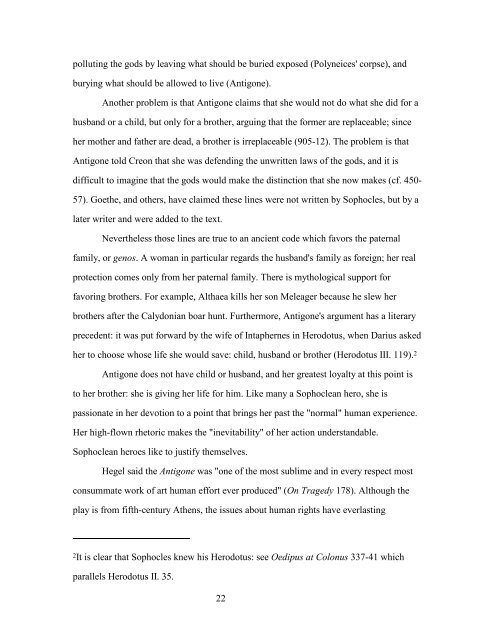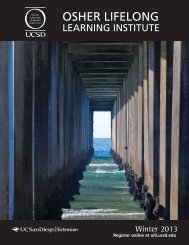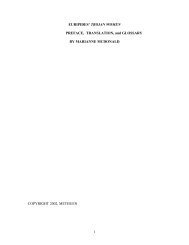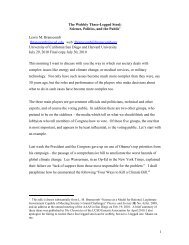1 Sophocles' Antigone Introduction, translation, and notes by ...
1 Sophocles' Antigone Introduction, translation, and notes by ...
1 Sophocles' Antigone Introduction, translation, and notes by ...
You also want an ePaper? Increase the reach of your titles
YUMPU automatically turns print PDFs into web optimized ePapers that Google loves.
polluting the gods <strong>by</strong> leaving what should be buried exposed (Polyneices' corpse), <strong>and</strong><br />
burying what should be allowed to live (<strong>Antigone</strong>).<br />
Another problem is that <strong>Antigone</strong> claims that she would not do what she did for a<br />
husb<strong>and</strong> or a child, but only for a brother, arguing that the former are replaceable; since<br />
her mother <strong>and</strong> father are dead, a brother is irreplaceable (905-12). The problem is that<br />
<strong>Antigone</strong> told Creon that she was defending the unwritten laws of the gods, <strong>and</strong> it is<br />
difficult to imagine that the gods would make the distinction that she now makes (cf. 450-<br />
57). Goethe, <strong>and</strong> others, have claimed these lines were not written <strong>by</strong> Sophocles, but <strong>by</strong> a<br />
later writer <strong>and</strong> were added to the text.<br />
Nevertheless those lines are true to an ancient code which favors the paternal<br />
family, or genos. A woman in particular regards the husb<strong>and</strong>'s family as foreign; her real<br />
protection comes only from her paternal family. There is mythological support for<br />
favoring brothers. For example, Althaea kills her son Meleager because he slew her<br />
brothers after the Calydonian boar hunt. Furthermore, <strong>Antigone</strong>'s argument has a literary<br />
precedent: it was put forward <strong>by</strong> the wife of Intaphernes in Herodotus, when Darius asked<br />
her to choose whose life she would save: child, husb<strong>and</strong> or brother (Herodotus III. 119). 2<br />
<strong>Antigone</strong> does not have child or husb<strong>and</strong>, <strong>and</strong> her greatest loyalty at this point is<br />
to her brother: she is giving her life for him. Like many a Sophoclean hero, she is<br />
passionate in her devotion to a point that brings her past the "normal" human experience.<br />
Her high-flown rhetoric makes the "inevitability" of her action underst<strong>and</strong>able.<br />
Sophoclean heroes like to justify themselves.<br />
Hegel said the <strong>Antigone</strong> was "one of the most sublime <strong>and</strong> in every respect most<br />
consummate work of art human effort ever produced" (On Tragedy 178). Although the<br />
play is from fifth-century Athens, the issues about human rights have everlasting<br />
2 It is clear that Sophocles knew his Herodotus: see Oedipus at Colonus 337-41 which<br />
parallels Herodotus II. 35.<br />
22









